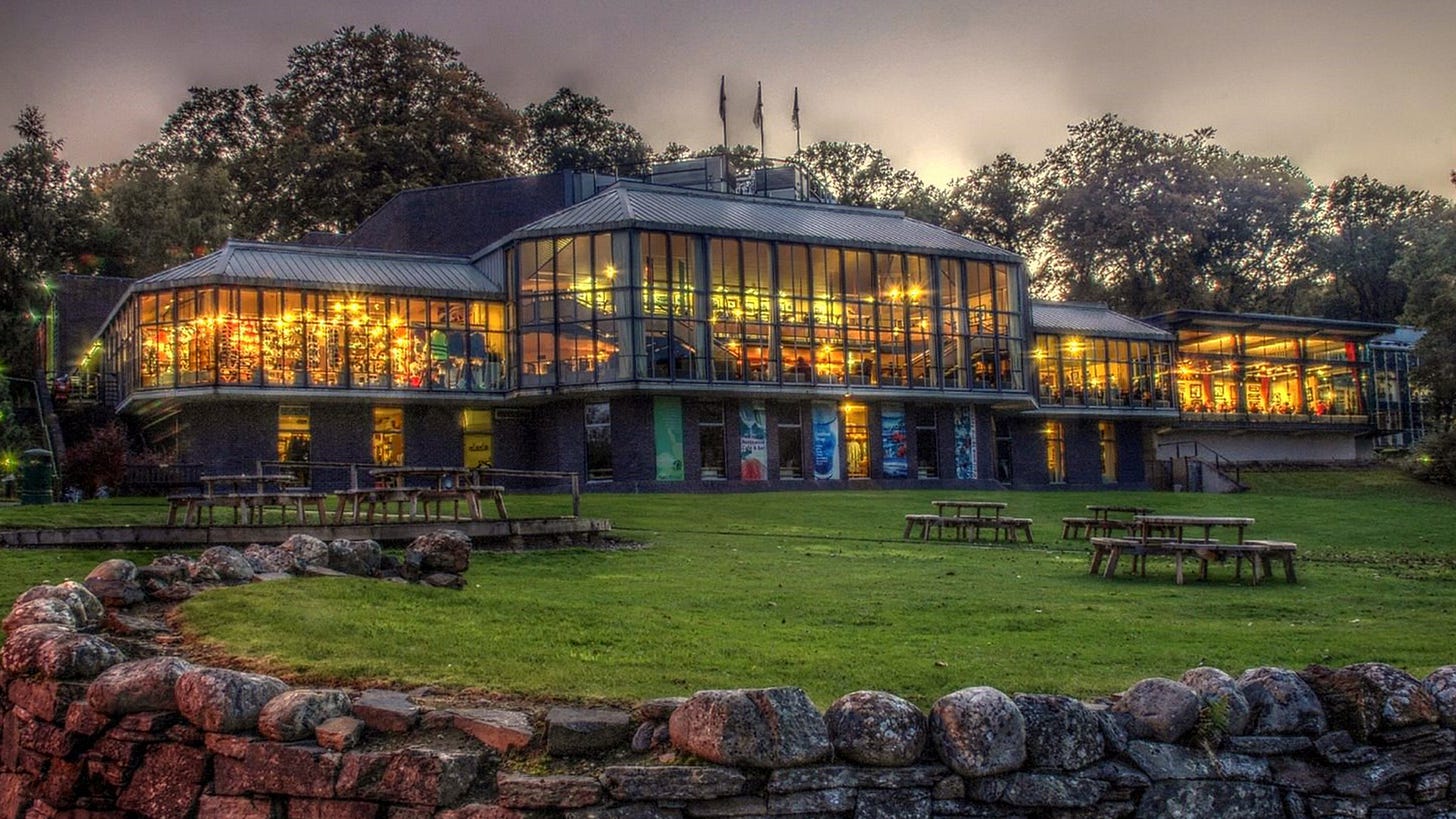Elizabeth Newman - artistic director, Pitlochry Festival Theatre
From Croydon, to Bolton, to a small town in Perthshire.
Morning…
Or afternoon, or evening, depending on when you open this email. It’s Friday again. It’s 11.45am. Welcome to the fifth issue of The Crush Bar, my free, fortnightly newsletter about theatre and the people that make it.
Below is an interview with the inspiring Elizabeth Newman of Pitlochry Festival Theatre, who spoke to me over the phone from Perthshire a couple of weeks ago, when it was -16°C there - and not much warmer here in Edinburgh. Before that, though, please subscribe if you haven’t already…
And, if you wouldn’t mind giving the newsletter a wee share - forward it, tweet about it, mention it to someone you think might be interested - then that would be brill. And, if you want to contact me about it, or about anything to be honest, then you can just reply to this email and it will find me.
Interview: Elizabeth Newman
Elizabeth Newman’s career has been one long journey north. She started in South London, spent eight years at Bolton’s Octagon Theatre, and has ended up in Perthshire in the hilly heart of Scotland. She is artistic director of Pitlochry Festival Theatre, the 550-seat playhouse snuggled against the banks of the River Tummel, in the shadow of the snow-capped Ben Vrackie.
“Lots of people thought I was insane when I moved up here,” the 35-year-old says. “But that’s because people have a specific idea about what you are meant to do with your career, and this isn’t it. It comes down to values – empathy, integrity, respect, inspiration – and Pitlochry offered those things for me.”
The last time Newman and I spoke, things were not looking good. It was June, before the performing arts industry had received any emergency government support, and insolvency was staring Pitlochry Festival Theatre straight in the face. What made the theatre particularly vulnerable was its relatively low level of state support, and its reliance on ticket sales through the summer to generate the majority of its income.
“We are economically shot to pieces,” Newman told me then, her typically upbeat voice not particularly cheery at all. “But we can’t allow ourselves to go bankrupt, because if we go bankrupt, we will never come back.”
“When you are really ill, you go from an acute stage to a chronic stage, and that’s what it feels like now…”
Eight months on, and the situation is not quite as bleak. Support did eventually arrive - £400,000 from Creative Scotland – and the prospect of re-opening later this year looks promising. The difficult mitigating measures Pitlochry Festival Theatre took – redundancies, reductions, tightening of belts and budgets – has enabled it to survive the storm. But, says Newman, the road back to full health is a long one.
“When you are really ill, you go from an acute stage to a chronic stage, and that’s what it feels like now,” she says. “I’m not living in crisis mode like I was last year, when I had to make quick, life-and-death decisions every day. Now, I get up in the morning, and I think: “Okay, we’re still here. We’re still ill. But what can we do to make sure we don’t get sicker? What can we do to move forward?”
Despite everything, Pitlochry Festival Theatre is managing to move forward. In October, it submitted a planning application for a 175-seat studio space. In January, it announced its first ever winter ensemble, a group of 21 actors brought together to make digital work. And, in March, it will release the first of eight audio plays created in collaboration with Edinburgh’s Lyceum Theatre as part of its major new project, Sound Stage.
There’s a reason Newman reaches for a medical metaphor to describe the situation her theatre is in at the moment. Born in 1986 in Croydon, her first ambition was to be a ballet dancer but a serious neurological condition that affected her motor skills for several years forced her to reconsider. She found theatre when she was sixteen, and thinks that diving headfirst into directing at such an early age has had a profound impact upon her.
“I started directing because you could do it from a wheelchair, and you didn’t really need the use of your arms and legs,” she says. “I directed a play before I’d seen one. I’d seen a pantomime and I’d seen a ballet, but I’d never seen an actual play. And that experience – of feeling and thinking your way through an experience without an external force informing you what is right and wrong – has massively influenced me.”
Newman studied directing at Rose Bruford College, and founded a company – Shared Property – when she was just nineteen. Success in London’s fringe theatre scene meant that when Southwark Playhouse’s then artistic director Ellie Jones went on sabbatical, Newman was given the role temporarily. She was 22.
“A theatre is like a vicarage. I had to decide whether I would be the right vicar for Pitlochry…”
Her first move north came in 2009, when Newman arrived at the Bolton Octagon as part of the Regional Theatre Young Directors Scheme – one of the great unseen engines of the theatre industry, that gives eight promising directors their first taste of running a building every year. She was only supposed to be there for a few months, learning from then artistic director David Thacker, but ended up staying for nearly a decade as associate director, before succeeding Thacker in the top job in 2015. If her tenure was defined by anything, it was a commitment to the local community.
“I love Bolton,” she says. “Present tense. Some of my closest friends are Boltonians. I still wear the shirt with my name on the back that the football club gave me. But I’d been there for nearly a decade when Pitlochry approached me about applying for this job, and I think buildings need new energy after a while. I thought: “If I don’t go now, I’ll never go.”
Even when Newman had made up her mind that she needed Pitlochry Festival Theatre, she thought long and hard about whether Pitlochry Festival Theatre needed her.
“As an artistic director, you have to know that you can give something of worth to a theatre, otherwise you shouldn’t go,” she says. “A theatre is like a vicarage. I had to decide whether I would be the right vicar for Pitlochry. There’s nothing worse than someone just rocking up out of the blue and taking charge.”
Newman has definitely brought new energy to Pitlochry Festival Theatre. Traditionally, as its name suggests, the building only came alive in the sunny summer months when tourists flocked to the tiny town, and an ensemble of actors performed a punishing repertory of six shows. It had a reputation as a bit of an independent entity within Scottish theatre – as a “Perthshire outpost of English theatre”, in the words of The Scotsman’s Joyce McMillan.
A decade ago, Newman’s predecessor, the late John Durnin, added standalone shows in autumn and winter to the bill, starting the slow reinvention of a theatre that had become known by many as a tourist attraction with little artistic credibility. Newman arrived in July 2018, determined to continue Durnin’s work, and to turn the venue into a major producing house year-round – a hub for the performing arts in the heart of Scotland that engaged with everyone, from the local community, to visiting tourists, to the rest of the Scottish theatre industry.
“The board were looking for change,” Newman says of her appointment. “They were looking for transformation. And when I visited and did my research, it became clear that change was needed, both for ideological reasons, and for the financial health of the organisation.”
“When a show is really made for a specific theatre space, there’s something so alive about it…”
Her plan, in practical terms, was to add more productions in autumn and winter, to tour more, and to collaborate and co-produce more – something the theatre rarely did previously. To maintain the theatre’s existing audience while engaging with new visitors from both the local community and the rest of Scotland. To stage the crowd-pleasing classics that are essential for the theatre’s survival, given its low level of subsidy, but to throw a few more adventurous shows into the mix, too.
“The truth of the matter is that I believe in making organisations,” Newman says. “As in – theatres and communities that make work together. I think when a show is really made for a specific theatre space, there’s something so alive about it. And I think audiences can feel that. It’s the difference between getting a great suit off the rack and getting a great suit from a tailor. Pitlochry is a making theatre.”
Newman’s first season in 2019 demonstrated her ambitions clearly. A five-star revival of Brian Friel’s Faith Healer that toured the Highlands and Islands, alongside sure-fire hits in Blithe Spirit and The Crucible. A production of Scotland-based playwright Nicola McCartney’s neglected 1998 drama Heritage. A new adaptation of Elizabeth Gaskell’s North And South, which prompted The Guardian’s Mark Fisher to remark that “rarely has this theatre seemed so much part of the public sphere”. Old and new, classic and rediscovered, popular and political, Scotland and the world.
Things were shaping up nicely for her second season in 2020, too. A David Greig world premiere. A new adaptation of Sense and Sensibility by Glasgow-based playwright Frances Poet. A Noel Coward, a Tennessee Williams, a revival of the musical Gypsy. All that to come after its first ever spring show – a staging of Barefoot In The Park, co-produced with the Edinburgh Lyceum.
All of that had to be cancelled, apart from a few performances of Barefoot In The Park in mid-March. Instead, the last eleven months have been the hardest of Newman’s career so far. She has had to face difficulties she never wanted to face, make decisions she never wanted to make, in order to ensure there was a Pitlochry Festival Theatre on the other side of the pandemic. But the setbacks and sorrows of the last year haven’t dampened her appetite to put Pitlochry Festival Theatre on the map – to turn it into a powerhouse of Scottish theatre, in a way it has never been before.
“Pitlochry is the heart of Scotland,” she says. “So I want us to be the heart of Scottish theatre, pumping life out around the country. I want us to fling open our doors and connect with collaborators across Scotland. That’s what we’ve done already, I think. And that’s what we are going to keep doing.”
“The most helpful thing someone could do for me is…”
Prioritise kindness and empathy.
Have an awareness of the context of ideas and decisions.
Really be excited about and care for audiences.
"If you want to get an idea of what I do…”
I am curious about many different kinds of things. I try to expose my mind to many different kinds of art, music, politics and facts about the world.
I say I don’t know a lot - and this opens lots of new doors and new ideas and new knowledge.
I watch a lot of fantastic, classic television to escape and find inspiration - programmes like The Good Life, State Of Play, Star Trek: The Next Generation, Dennis Potter’s stuff. It’s very diverse.
Bits and bobs, shouts and murmurs…
Typical, the latest show from Nouveau Riche (remember Queens Of Sheba?) and Ryan Calais Cameron, is available via Soho Theatre on Demand. And I interviewed Ryan for The Stage last week - apparently he wrote the first draft of Typical in one night. Yeah, I know.
If you are interested in a bit more from me - and why wouldn’t you be?! - then there is this bit about a robot writing a play, and this bit about the upcoming film adaptation of Florian Zeller’s The Father, and how it made its way from Paris, to Bath, to London, to Hollywood.
Interviewee three Vera Chok’s new play, Rice!, opened online last weekend, and it’s available this weekend, too. You’re probably too late to do the cooking bit, but you’ve got plenty of time to buy a ticket for the watching bit. I’m seeing it tomorrow afternoon.
This Guardian piece by David Jays on the challenges facing British theatre and dance companies post-Brexit is particularly depressing. I had no idea how much of a loss leader touring the UK is for big dance companies.
Howlround (which I’ve only just discovered) has this very thought-provoking essay from NYC-based designer Masha Tsimring on work, money, and how freelancers have been left out in the cold during the pandemic. It’s about America, but some of the stuff it says is easily applicable to the UK.
Some audio drama to wrap your ears around to finish: Recognition, by Amanda Wilkin, is the latest release in 45North and Ellie Keel’s Written On The Waves series. It’s an hour long, it’s about the composer Samuel Coleridge-Taylor, and it’s great.
And I’ve only just spotted that Lung Theatre’s superb verbatim drama Who Cares - which ran at the Edinburgh Fringe in 2019 - has been adapted into a radio play. Have tissues ready.
Byeee…
Thanks for reading. If you want to get in touch with me - to say hi, to chat about anything in the newsletter, to suggest future interviews - then I’m @FergusMorgan, or you can just reply to this email. If you get the chance, please do share this with someone…
I’ve got very into making fresh pasta lately, so I’m going to spend all weekend feeding dough through my new Lakeland pasta roller and listening to podcasts. Hope you are up to something similarly relaxing. See you in a fortnight…
Fergus x






